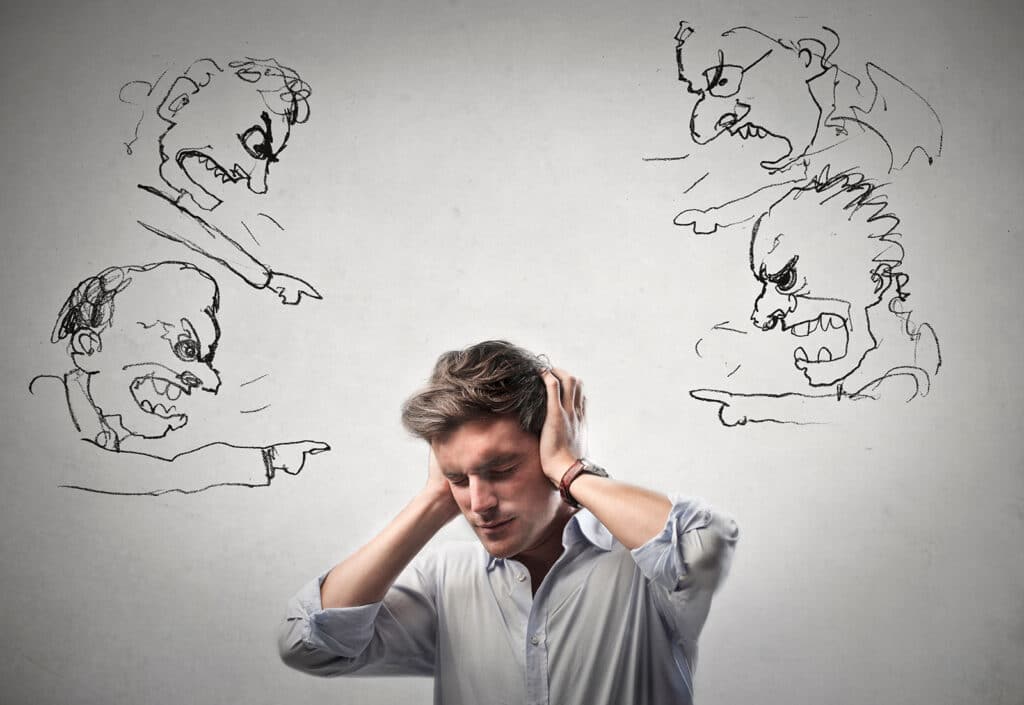Those who experience emotional, physical, or other types of abuse as children may have trouble processing what happened to them. In fact, it’s fairly common for young abuse victims to block out any memory of the adverse events that they went through. However, repressed memories or repressing memories, otherwise failing to come to terms with these events, may lead to more trouble as an adult.

Table of Contents
You Seek Out Toxic Relationships
Navigating the treacherous waters of relationships can be especially challenging for survivors of childhood trauma. If you spent most of your formative years being taken advantage of, enduring emotional or physical abuse, or feeling neglected, the concept of healthy relationships may seem elusive. Instead, you may find yourself drawn to individuals who exhibit familiar patterns of manipulation, disrespect, or even outright abuse. This propensity to seek out toxic relationships is often rooted in the deep-seated wounds of unresolved childhood trauma, perpetuating a cycle of pain and dysfunction.
Survivors of childhood trauma often grapple with profound feelings of unworthiness and inadequacy stemming from years of being mistreated or neglected. The traumatic event or childhood memories of abuse or neglect may become repressed, buried beneath layers of dissociative amnesia, yet their lingering effects continue to shape one’s perceptions and behaviors in adulthood. As a result, individuals may struggle to believe that they deserve love, respect, or healthy relationships. Instead, they may internalize the belief that toxic behaviors such as snarky comments, physical abuse, or manipulation are normal or even deserved, perpetuating a self-destructive cycle of victimhood.
The fear of abandonment looms large in the psyche of trauma survivors, driving them to cling desperately to any semblance of connection, even if it comes at a great cost to their well-being. This intense fear of being alone or rejected may lead individuals to tolerate unacceptable behavior from their partners, rationalizing or excusing abuse in a desperate bid to maintain the illusion of love and security.

Furthermore, unresolved childhood traumatic experiences often manifest in debilitating symptoms such as low self-esteem, mood swings, and post-traumatic stress disorder (PTSD). These psychological scars render individuals particularly vulnerable to the manipulative tactics of toxic partners, who exploit their vulnerabilities for their own selfish gain. The cycle of abuse becomes a familiar dance, with trauma survivors unwittingly playing out roles scripted by their past experiences.
Breaking free from the grip of toxic relationships requires courage, self-awareness, and a willingness to confront the painful truths of one’s past. Therapy modalities such as cognitive behavioral therapy (CBT), eye movement desensitization and reprocessing (EMDR), and exposure therapy can provide invaluable tools for processing traumatic memories, challenging distorted beliefs, and developing healthier coping mechanisms. Through the guidance of compassionate caregivers and the support of a therapeutic community, survivors can begin to reclaim their sense of self-worth and break the cycle of abuse.
In conclusion, the journey toward healing from childhood trauma and escaping toxic relationships is arduous but achievable. By confronting the underlying wounds of unresolved trauma, survivors can liberate themselves from the shackles of victimhood and cultivate relationships that are based on mutual respect, trust, and genuine care. Through validation, support, and therapeutic intervention, trauma survivors can rewrite their narratives, reclaim their agency, and embrace a future defined by wellness, resilience, and authentic connection.

You Tend to Push People Away
In the complex interplay between past traumas and present behaviors, the tendency to push people away stands as a poignant hallmark of repressed childhood trauma in adults. For many survivors, the echoes of adverse experiences resonate deeply, shaping their perceptions of self-worth and interpersonal relationships. The scars of emotional or physical abuse, neglect, or other adverse childhood experiences often breed profound feelings of unworthiness and mistrust, compelling individuals to retreat into isolation rather than risk vulnerability.
This defensive posture, though seemingly protective, becomes a double-edged sword, erecting emotional barriers that thwart genuine connection and intimacy. Survivors may find themselves trapped in a cycle of self-imposed solitude, unable to break free from the grip of past traumas. Even acts of kindness or acceptance may be met with skepticism as individuals grapple with deeply ingrained beliefs that genuine affection is synonymous with manipulation or betrayal.
Moreover, the fear of intimacy looms large in the psyche of trauma survivors, rooted in early childhood experiences of abandonment or betrayal. The prospect of emotional closeness evokes profound anxiety, triggering a cascade of defensive mechanisms aimed at preserving emotional autonomy. As a result, individuals may push away even those who genuinely care for them, perpetuating a cycle of isolation and loneliness that further exacerbates feelings of unworthiness and despair.
You Have Intense Reactions to Mundane Events
Trauma could cause you to become especially sensitive to certain smells, sounds, or other seemingly mundane triggers. In some cases, you may not even realize that something is a trigger until you find yourself crying because you saw a red car or heard a bird chirping in the park. Those who don’t know about your past may believe that you are immature or suffer from some sort of mental illness. In fact, you may also believe that these reactions are the result of a mental illness or something other than a response to childhood trauma.

You Hate to Lose Control
Over time, you may feel that the best way to prevent yourself from becoming a victim is to micromanage every aspect of your life. For instance, you may choose to live in a particular apartment building because it has a specific type of security system. You may choose to work for a company that allows you to perform tasks from home because it means interacting with fewer people.
If you have to move from your apartment or find a new job, you may experience a variety of intense negative emotions. Of course, your feelings have less to do with the fact that you have to find a new place to live than it does with the feeling that you don’t feel safe.
Intense stress may result in physical ailments such as high blood pressure, obesity, or grinding your teeth. It may also exacerbate existing physical or mental health issues such as ADHD or PTSD.
You’re Consistently Inconsistent
Depending on how you feel, you may vacillate between not wanting people in your life to doing everything you can to make friends or find a romantic partner. You may believe that your self-worth is tied to your ability to find a partner. Therefore, you will simply agree to date or live with the first person you meet at a bar or at your friend’s social event.
Of course, you may find yourself wanting nothing more than to exit that relationship if that person isn’t as committed to it as you are. This may be true even if you have just met this individual and are in the stage of the courtship when neither person is expected to be exclusive with the other.
You may also cheat on a partner or take other actions to sabotage a long-term relationship because you assume that person is better off without you. After making such an impulsive decision, you may be willing to do whatever it takes to get that person back, even if the relationship is now permanently tainted.

Handling Criticism Isn’t Your Strong Suit
As a victim of childhood trauma, you already feel as if you don’t have the right to exist. Therefore, any criticism that you receive from your boss, spouse, or best friend may be perceived as a cheap shot or uncalled for. This may be true even if the feedback that you receive is couched in positive language or is a valid critique of something that you have said or done.
An inability to take constructive feedback from your boss may make it harder to hold a job or advance in your career. An inability to handle negative interactions with colleagues or customers may also hold you back, as you may be seen as unstable or lacking in the skills needed to be a leader.
You may also find that people simply don’t want to associate with you because they can’t be vulnerable in your presence. This may only serve to deepen any feelings of guilt or anxiety that you already carry and may simply reinforce your perception that you aren’t worthy of love or affection.
You Get Too Deep Inside Your Own Head
One of the problems of feeling as if you don’t belong is that you don’t think that anyone wants to hear about your problems. Therefore, instead of talking to a friend, family member, or therapist, you simply keep your thoughts bottled up inside, where no one can judge or criticize them.
While you may feel that you are the best judge of what is happening to you, this is not always the case. For instance, you may think that your friend isn’t returning a text message because that person hates you. However, it’s possible that your friend is simply busy at work, driving home, or is otherwise unable to engage in conversation.
There is also a chance that those around you aren’t as engaging as you’d like because they also suffer from anxiety or are socially awkward for reasons you don’t understand. The fact that you lack the capacity to see things from other points of view may cause you to overlook those possibilities and immediately assume the worst.

You May Take Unnecessary Risks
If you don’t feel like you have any inherent value as a person, you might not worry about your health and safety. You might also feel as if there is no point in worrying about how your actions might impact others. Ultimately, you may be at a greater risk of taking drugs, consuming large quantities of alcohol, or spending hours every day at the casino.
In some cases, you may take unnecessary risks while under the influence of drugs or alcohol. This is because these substances tend to lower your inhibitions and increase your pain tolerance. You may also be more vulnerable to spending money on food, items that you see on the internet, or other goods or services that you don’t need or wouldn’t buy while sober.
In an effort to obtain money to buy drugs or pay other expenses, you may engage in prostitution or other criminal enterprises. If you are convicted of a crime, it may cause you to become further isolated from whatever support system you do have. The presence of a criminal record or a substance abuse issue might also make it harder to find a job or maintain custody of your kids.If you believe that you are struggling as an adult because of childhood trauma, which might cause health conditions and other health problems, it may be worthwhile to speak with a mental health professional. The folks at Recreate Life Counseling offer a variety of services that are tailored to meet your needs. You or your loved one can get in touch with us today to learn more about our types of therapy services and healing process or to enroll in a program that includes psychotherapy.
Published on: 2022-12-30
Updated on: 2024-04-10



